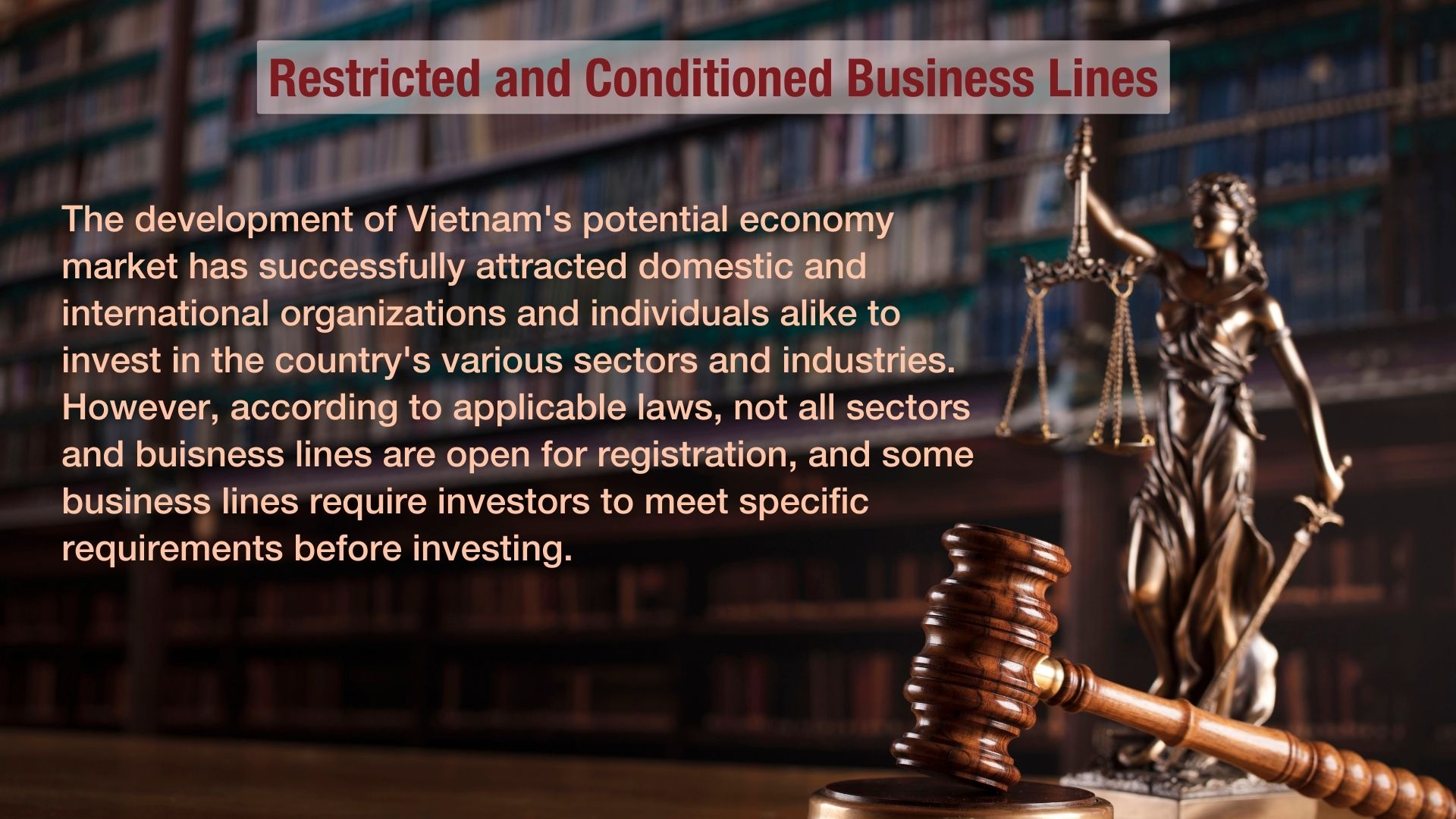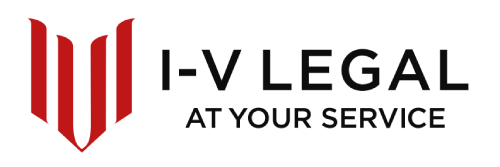
Restricted and Conditioned Business Lines
The development of Vietnam’s potential economy market has successfully attracted domestic and international organizations and individuals alike to invest in the country’s various sectors and industries. However, according to applicable laws, not all sectors and buisness lines are open for registration, and some business lines require investors to meet specific requirements before investing.
Thus, our Article on the list of restricted and conditioned business lines in accordance with the provisions of the Law on Investment No. 61/2020/QH14 issued on June 17, 2020 (“Law on Investment 2020“) and the Law on Investment No. 67/2014/QH13 issued on November 26, 2014 (“Law on Investment 2014“) aims to provide specific guidance for both domestic and international investors in selecting their lines of business.
I. Prohibited Business Lines
Pursuant to Clause 1 Article 6 of the Law on Investment 2020, prohibited business lines consist of the following 8 lines of business:
- Prohibition on narcotics business
Law on Investment 2020 specifies in Appendix 1 a list of 47 narcotic substances prohibited from business investment. Compared to the Law on Investment 2014, the Law on Investment 2020 has added two more substances which are Khat leaves and Opium, as well as opium derivatives (except for the case of ethyl ester of iodinated fatty acid in poppy seed oil that no longer contains narcotic substances from opium) to the list of banned business lines.
In the event of violations, offenders shall face the following penalties:
(i) Criminal Sanction: According to the crimes related to narcotics as stipulated in the Criminal Code No. 100/2015/QH13 amended on June 20th, 2017 (“Criminal Code 2015“), offenders may sanctions such as imprisonment ranging from 6 months to 20 years, life sentence, or capital punishment.
(ii) Administrative Sanction: Offenders may face administrative fines ranging from VND 5,000,000 to VND 500,000,000, be prohibited from holding occupational titles, face professional practice or specific work suspension/prohibition for a period of 1 to 5 years, or face seizure partly or fully of their assets, depending on the severity and nature of the violation.
- Prohibition on Business Involvement in Certain Types of Chemicals and Minerals
Law on Investment 2020 prohibits investment and business involvement in 18 specific types and groups of chemicals and minerals, as listed in Appendix II in which compared to the Law on Investment 2014, Law on Investment 2020 has specified the amphibole group asbestos and included one additional type/group as follows:
(i) Dodecyl benzene sulfonic acid (DBSA)
(ii) Crocidolite asbestos
(iii) Amosite asbestos
(iv) Anthophyllite asbestos
(v) Actinolite asbestos
(vi) Tremolite asbestos
Additionally, the list of prohibited chemicals for investment, business, and production has been expanded in the List of chemicals in table 1[1].
Violations of the above-mentioned provisions shall result in administrative sanctions with monetary fines ranging from VND 200,000 to VND 100,000,000[2].
- Prohibition on Business Involvement in Certain Specimens of Wild Plant and Animal Species
Law on Investment 2020 prohibits investment and business involvement in 258 types of wild plant and animal specimens originating from natural sources as specified in various documents, including:
(i) Appendix I of the Convention on International Trade in Endangered Species of Wild Fauna and Flora (CITES). Specimens of various endangered, rare, and valuable wild plant and animal species.
(ii) Group I specimens originating from natural sources, as listed in Appendix III, “List of Endangered, Rare, and Valuable Wild Plant and Animal Species – Group I,” issued in accordance with the Law on Investment 2020.
In the event of violations, offenders may face the following sanctions:
(i) Criminal Sanction: Offenses related to these types of wild plant and animal specimens that are stipulated in the Criminal Code shall result in imprisonment ranging from 1 year to 10 years.
(ii) Administrative Sanction: Offenders may face administrative penalties, including monetary fines ranging from VND 500,000,000 to VND 15,000,000,000, job position disqualification, professional practice suspension, or specific work prohibition for a period of 1 to 5 years, depending on the severity and nature of the violation[3].
- Prohibition on Business in Prostitution
According to the provisions on prevention from and combat against prostitution, “Prostitution is the act of buying and selling sexual services.”[4] Offenders shall be subject to the following sanctions:
(i) Criminal Sanctions: Offenders can face criminal penalties with sentences ranging from 6 months to 20 years in prison, depending on the severity and nature of the offense, as well as other related charges.
(ii) Administrative Sanctions: Offenders may face administrative penalties, including monetary fines ranging from VND 10,000,000 to VND 300,000,000, probation for a period of 1 to 5 years, as well as seizure partly or fully of their assets, depending on the severity and nature of the violation[5].
- Prohibition on Buying and Selling Humans, Corpses, Body Parts, and Human Fetuses
The act of buying and selling of humans or human body parts, as stipulated in Article 154 of the Criminal Code, is considered a criminal offense and is subject to criminal prosecution with penalties ranging from 3 to 20 years in prison, depending on the severity and nature of the offense.
- Prohibition on Business Activities Related to Human Cloning
Human cloning refers to the method of reproduction where the offspring is generated from a single maternal organism and inherits genes solely from the maternal organism.
Acts of engaging in human cloning techniques shall be subject to administrative sanction, including monetary fines ranging from VND 5,000,000 to VND 10,000,000 and shall be confiscated any unlawfully gains resulting from such violation[6].
- Prohibition on Fireworks Business
Fireworks are “products containing explosive substances that, when subjected to shock from mechanical, thermal, chemical, or electrical actions, result in secondary chemical reactions, generating intense heat, gas, sound, light, or color effects in the surrounding space, leading to either noise or noiseless pyrotechnic displays. Fireworks include fireworks and pyrotechnic products.”[7]
Subsequently, acts of unlawful transport, storage, or possession of fireworks or explosive substances shall result in administrative penalties, with monetary fines ranging from VND 1,000,000 to VND 20,000,000[8].
- Prohibition on Debt Collection Services
The prohibition on engaging in debt collection services is a new provision introduced in the Law on Investment 2020. From January 1st, 2021, conducting debt collection services shall be seen as violation of the law and shall subsequently be subject to administrative sanctions. Engaging in debt collection services shall be subject to administrative penalties ranging from VND 60,000,000 to VND 80,000,000[9]. Additionally, assets and means involved in such violation shall be seized, and any unlawfully obtained gains shall be confiscated and forcefully returned.
II. Conditional Business Lines
- Regarding the List of Conditional Business Lines
Conditional business lines are consisted of 227 lines of business specified in Appendix IV of the Law on Investment 2020. For example, business lines such as seal production, security service, and legal practice all fall under this category.
- Regarding Applicable Forms of Conditional Business Lines
(i) License
+ Business License
A business license, often referred to as a “sub-license,” is one of the legal prerequisites for individuals or entities to engage in specific designated industries or occupations.
Enterprises are required to obtain licenses as specified in Section 6, Article 7 of the Law on Investment 2020 when operating business lines within the “List of Conditional Business Lines” For instance, business licenses for operating in social media services, electronic information websites, transport services, liquor and tobacco sales, chemical business, and rice exports, etc.
(ii) Certificates
+ Certificate of Eligibility for Business Operation
Competent authorities shall issue the Certificate of Eligibility for Business Operation once investors meet certain requirements related to facilities, personnel, or other aspects of their operations. After receiving this certificate, investors are allowed to start their businesses. Examples include Certificates for fire fighting and prevention, security and order, food safety and hygiene, quality and standards for goods, etc.
+ Investment Registration Certificate
Pursuant to Clause 11 Article 3 of the Law on Investment 2020: “Investment Registration Certificate is a document, in paper or electronic form, that records the investor’s registration information regarding an investment project”. This certificate is mandatory for activities that involve foreign capital in Vietnam to ensure effective oversight and management of foreign investment in the country.
(iii) Professional Certificates
Depending each professions and industries will the lave have different requirements for Professional Certificates in which they may be required to specify the number of individuals who must hold professional practice certificates, or dictate the roles individuals with professional certificates must play within a business. Examples include Professional Certificate for Legal Practitioners, Doctors, Pharmacists, Auditors, and Brokers.
(iv) Written Confirmations and Approvals
Confirmation of work experience or evidence of the length of time an individual has been involved in a specific business activity may be required in some cases to confirm their qualifications to perform the activity.
(v) Other requirements that individuals or economic entities must meet to engage in investment and business activities that may not require written confirmation from a competent authority.
[1] Decree No. 38/2014/ND-CP dated May 06, 2014, on the management of chemicals governed by Convention on the prohibition of the development, production, stockpiling and use of chemical weapons and on their destruction
[2] Article 30, 31, 32, 33, 34, 35, 36 Decree No. 71/2019/ND-CP dated August 30, 2019 on penalties for administrative violations against regulations on chemicals and industrial explosive materials
[3] Point đ, e Clause 3 Article 232, Article 234 Criminal Code 2015
[4] Clause 3 Article 3 Ordinance No. 10/2003/PL-UBTVQH11 of March 17, 2003, on prostitution prevention and combat
[5] Article 327, 328, 329 Criminal Code 2015
[6] Article 60 Decree No.82/2020/ND-CP of July 15, 2020, regulation on sanction of administrative violation in the field of judicial assistance, judicial administration, marriage and family, civil judgment enforcement, enterprise and cooperative bankruptcy
[7] Point a Clause 1 Article 3 Decree No. 137/2020/ND-CP dated November 27, 2020 on management and use of pyrotechnics
[8] Article 11 Decree No. 144/2021/ND-CP dated December 31, 2021 on administrative penalties for violations against regulations on social safety, security, order; social evils, fire prevention and firefighting; rescue; domestic violence prevention and control
[9] Article 7 Decree No. 98/2020/ND-CP dated August 26, 2020 prescribing penalties for administrative violations against regulations on commerce, production and trade in counterfeit and prohibited goods, and protection of consumer rights




Related posts
The Department of Labour, War Invalids and Social Affairs issued Decision No.1560/QD-LDTBXH
On October 17th, 2023, the Department of Labour, War Invalids and Social Affairs issued Decision [...]
Oct
Decision No. 364/QĐ-CA regarding the announcement of case laws
On October 1, 2023, the Supreme People’s Court has issued Decision No. 364/QĐ-CA regarding the [...]
Oct
Legal aid priorities for healthcare M&A in Vietnam
When it comes to M&A in the pharmaceuticals field, it goes without saying that this [...]
Sep
Amendments to 10 visa, exit and entry documents templates
On June 30th, 2023, the Minister of the Ministry of Public Security has promulgated Circular [...]
Aug
Policy tweaks can tap pharma investment trends
On July 20th, 2023, Managing Partner of Indusviet Legal LLC – Ms. Duong Thi Mai [...]
Jul
Contributed assets of enterprises
Before deciding to establish an enterprise or invest by contributing capital to an enterprise, individuals [...]
Jun